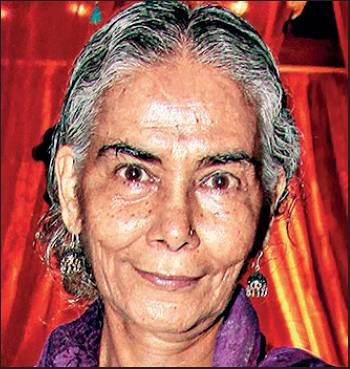Surekha Sikri
This is a collection of articles archived for the excellence of their content. |
A brief biography: 1945-2021
Avijit Ghosh, July 17, 2021: The Times of India

From: Avijit Ghosh, July 17, 2021: The Times of India
Whatever the medium, Sikri approached every part with sincerity and sensitivity; her acting always informed by an intense yet elegant aesthetics. One of her three national awards came for ‘Mammo’ (1994), richly deserved for her depiction of insecurity and anxiety that the part required. The other two came in Govind Nihalani’s telefilm, ‘Tamas’ (1988) and director Amit Sharma’s ‘Badhaai Ho’ (2018). Her cantankerous rustic motherin-law in ‘Badhaai Ho’ ranks among her finest performances and endeared her to a new generation of filmgoers.
Delhi-born Sikri learnt and honed her craft at National School of Drama and was a valued member of the repertory company during its high noon. Fellow actor MK Raina remembers getting blown away by her art. “I had the privilege of acting with her for the NSD repertory production, ‘Kabhi Na Chhode Khet’. There’s a scene when her son dies. I had never seen anything like this — that kind of range of acting. Again in Ebrahim Alkazi-directed John Osborne’s play, ‘Look Back In Anger’, she was simply, wow. Unfortunately, there are no videos of her work done those days. Even in a serial like ‘Balika Vadhu’, you could see she was a class apart,” says Raina.
Two of her much-remembered plays are ‘Aadhe Adhure’ and ‘Sandhya Chhaya’, where she acted with Manohar Singh, another titan of Delhi theatre. Sikri received the Sangeet Natak Akademi award in 1989. Film director Shyam Benegal remembers her as a “flawless” performer. “Her theatre training had made her a very disciplined actress. When you went on the sets when she was acting, you didn’t have to tell her. You gave her the scenes and she worked it out herself. She knew which costumes she had to wear, got her make-up done and was ready with the lines she had to speak... In a couple of takes, you would have a performance of the highest quality,” he told TOI over phone. Apart from ‘Mammo’, he directed her in ‘Sardari Begum’, ‘Zubeida’ and ‘Hari Bhari’.
Raina says that out of stage, Sikri was “happy-golucky”. During a phone interview last year, she had revealed an impish side to this reporter. She spoke of skipping class once at NSD to watch the movie, ‘Those Magnificent Men In Their Flying Machines’, and getting caught. We were suspended for a week from attending classes,” she had said. Not many know that Sikri had also translated Bertolt Brecht’s ‘The Threepenny Opera’. He sums up, “Meticulous, thinking and questioning, she was one of India’s front-ranking actors who has left a great legacy in theatres, in films and on TV.”